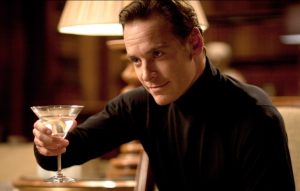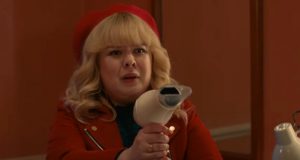
Picture this: a 46-year old man takes in a tribute screening of the original A Nightmare on Elm Street, not long after the death of beloved character actor, John Saxon (may he R.I.P.). Now, this same 46-year old, ranks this particular film as his #4 favorite movie of all time, having seen it hundreds of times since its initial 1984 release. But other than paying extra close attention to the work of the late Mr. Saxon, something additional stands out.
After 30-plus years of countless viewings, the film is deeply upsetting.
Why? Well, that is the overriding reason for this particular piece. Why are horror films, even beloved parts of my past, suddenly finding themselves unsettling in all the reaches of my brain? What has changed, and why? Let’s open this can of rotting worms, and take a little walk, shall we?
A bit of history. I first experienced the glory of horror when I was about 8 years old, and Creepshow was playing on HBO. It terrified me, yes (“Father’s Day” in particular), but it also intrigued me. Scratch that, it grabbed me and began a lifelong love affair with the macabre.
Eventually, A Nightmare on Elm Street also entangled me in its web and then more Romero came into view via 1985’s Day of the Dead (my all-time favorite film, of any genre). And it all blossomed from there. Now I am a film critic (covering horror) and a screenwriter (writing mostly horror). It’s safe to say that horror is and has been, my life.
But I’ve noticed an odd shift in how I view horror, in both new experiences and in old.
Ultra-violence has become something of a difficult pill to swallow.
I could say it began with the mid-2000’s and that era’s onslaught of terrible “torture porn”, which I never really liked. I mean, if it was something important to the story, I’d deal… but nastiness for the sake of nastiness? Not for me, and frankly – kinda lazy storytelling.
I’d like to chalk up this new “sensitivity” to the current state of the world – paving the way for overly dramatic emotional reactions to a film, but this shift began earlier than that.
Up until late 2018, I was reviewing full time (I had been since 2014), penning approximately 10 horror movie reviews a month. Could this “sensitivity” have been a simple case of burnout? Maybe? Maybe part of the shift?
As I examine this, I also think this new perspective simply has to do with age. I just celebrated that 46th milestone, and as one ages, obviously, your older loved ones, more advanced in age, begin to deteriorate and expire. Do we (as in I) begin to look at the fragility of life in a different way? Creaking knees and the threat of genetic issues possibly heading your way, does that open your eyes a bit? And does this new
outlook begin to infiltrate how we take in art? How we react to it?
My guess is, yes.
But let’s examine my earlier example. The first death in Wes Craven’s seminal film in the Nightmare franchise, is Tina Gray (portrayed by Amanda Wyss). As a 10-year old (who the hell was letting a 10-year old experience this film – parents of the year, that’s who!), I was scared, sure, but also enamored by Freddy, by the ingenuity of Tina’s death. Although, at that young age, I never would have fathomed how they achieved, behind the scenes, such a gruesome feat.

Being scared at a young age is exciting and dangerous. Is it the aging process, which brings us closer and closer to actual death, that’s sort of a buzz-kill when it comes to horror?
As a kid, Tina’s death was frankly, kinda awesome.
But this most recent viewing (and it had been a while), I found myself shaking my head “no” as her death just seemed to go on and on and on… painfully so. I didn’t like it, and certainly wouldn’t describe it as “awesome.” Tina is/was a real person. She had a boyfriend and friends and dreams. Sure, her mother was apparently a bit trashy and perhaps negligent, but seeing this young girl sliced open and thrown around a room? It was as unpleasant an experience as I ever could have imagined. But jeepers, how
many times have I witnessed this scene throughout my life and reacted with joy? Why was it so nasty now?
And other notable examples. I finally (a couple of years ago) read Misery by Stephen King. Now, I’d seen the movie countless times and I love it, but the book was absolutely horrifying to me. During the “ax sequence” (the hobbling scene in the film), I felt nauseous. Uncomfortable. And I’ll admit it, I even cried – I was that upset.
Where was that kid from 30 years ago, the same one watching the original The Texas Chainsaw Massacre with disgusting glee mixed with “I can’t handle this but I love it!” horror? What has become of him?

I have a strong stomach, and other than a few moments of insane gore witnessed in the horror films of my youth (the corpse pit/pool of Creepers, the eyeball/woodchip of Zombie come to mind), I got through them fine – perhaps wondering more “how’d they do that?”, rather than, “That must have been terrifying and painful, had the person been real!”
And perhaps that’s the takeaway here. I’ve always been an empathic person, reading folks and taking on their issues, worries and fears, sometimes too deeply. And I guess as you age, these “talents” grow and expand – allowing for fictional characters in peril – and well, for you to feel for them too.
I also feel obliged to mention that in one of my latest completed feature scripts, there’s a scene of such violent brutality, that when I conceived of it and began to write it, I was upset. Sure, I liked the character that needed to die, and yes, I was on edge about killing said character, but not on the same level of say, the Misery example. Then again, writing it – I was in total control.
An ultimate example of how horror is no longer “fun” (at least sometimes) comes from my screening of Hereditary, a couple of years back. I reviewed the film, mostly favorably, but there were a few moments in that flick, where I had to shut off my emotions. It was so raw, so nasty and so real – my brain could not handle it and so I clicked off that part of my mind. I mean, this is supposed to entertain me?

Now, this begs the question – how would I have reacted to these sequences, had I seen this in my teenaged hey-day of watching every horror film that crossed my path? Would I have looked at the infamous “telephone pole” scene and uttered an “awesome!”? I just don’t know.
The truth is, I think I’ve gotten soft. From age. From expanded experience and knowledge. From accepting that anxiety and heightened emotions are what I’m all about. From the hard knocks (real or imagined) of life.
As much as I adore horror that is organic and touches some deep, primal part of your experience, perhaps something lighter, like Friday the 13th might be in order. Then again, it’s been a minute since I watched it, so who knows how I’ll respond to it? Perhaps this aging, empathic mind will side more deeply (and sympathize) with poor, grieving Mrs. Voorhees. I mean, damn – she lost the light of her life to simple negligence. That’s terrible!

See what I mean? Sigh.
I’m afraid that after all of this, I’m not certain what the shift is, or why it’s happening. Certainly, some sound theories abound, but no firm answers exist at this time.
Bottom line: I doubt that I’ll ever leave horror behind. It’s a part of me. In fact, it is me.
So I’ll continue this enlightening journey with all that I love, knowing that there might come a time, as I continue to age – where something so vicious or insane in a horror flick, will require that I simply walk out or shut it off.
Thanks for this bit of therapeutic release. Anyone else experiencing similar shifts in your tastes, and how you handle ultra-violence? If so, what have you discovered?
And now I’m off to watch Gremlins. That’s some pretty innocent horror, right?
Oh wait. That microwave sequence…


